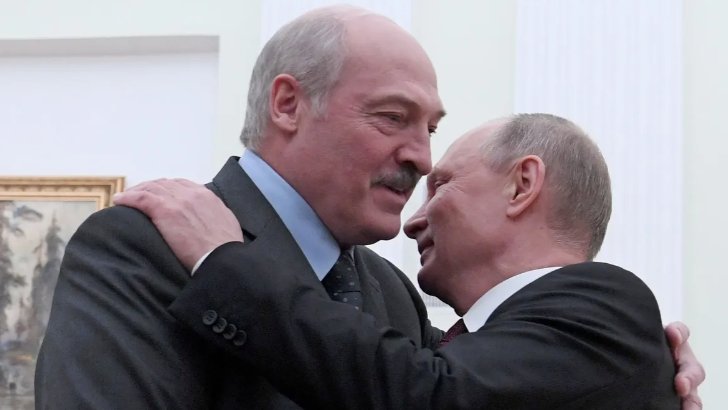“You know, the two of us are co-aggressors, the nastiest and most toxic people on the planet. We have only one quarrel — which one of us is bigger. Vladimir Vladimirovich (Putin — translator’s note) says it’s me. I’m starting to think it’s him” — with such frivolous jocularity Alyaksandar Lukashenka decided to amuse reporters during Vladimir Putin’s visit to Minsk on 19 December.
However, these pretend quarrels of “who’s bigger” are nothing more than coquettishness on his part. In the last two years, Lukashenka has voluntarily forsaken his voice, his decision-making, his very independence. This is the price for Russian support during the Belarusian protests in August 2020. So far Lukashenka has not reciprocated by presenting Putin with a bill for his co-aggression. Recent Russian-Belarusian relations can thus be defined by one word: bliss.
On closeness
Lukashenka has never been this close to Putin. Over the past two years, since mass protests started in Belarus, the number of their meetings has exceeded all diplomatic limits, even for countries that form a union. Even very close friends rarely meet so often nowadays — unless they live on the same floor. The rhetoric has also changed completely. Nothing seems to divide Putin and Lukashenka now — nor gas price coordination, nor forged phytosanitary certificates, nor tax manoeuvring, nor signing of union agreements. This is because they have a major common interest: circumventing sanctions.
During an extended government meeting on 16 December, as he was announcing Putin’s latest visit to Minsk, Lukashenka explained why their bilateral meetings had become so frequent: “Earlier, when meeting with the President, the Russian leadership, we discussed issues of a tactical nature. There was no way out of it because Russia and Belarus were subjected to terrible sanctions. There are a whopping 900 sanctions against Russia… And against us as well, so that, as they say, Russia doesn’t circumvent these sanctions through us. So we had to meet up during the year to react to the situation that developed as a result of the collective West’s pressure on us. That is, these were mostly pressing issues of a tactical nature. Nonetheless, at each meeting we tried to look into the future through these issues”.
According to Lukashenka, this year’s trying situation is a result of Western pressure and not of the war that Russia started. In the past, it was also the West to blame and not the massive political persecutions unleashed in Belarus.
Alyaksandar Lukashenka seems to have started believing that the mass protests in August 2020 were the West’s attack against him in order to deprive Belarus of its sovereignty — and that Russia was the brave ally that extended a helping hand:
“Russia has always helped us, and we too are helping the Russian Federation in its most difficult hour”.
Nothing brings people closer together than a shared problem. Before, the relationship between Lukashenka and Putin swung like a pendulum from brotherly embraces to fierce hatred simply because Russia did not really have any serious problems. Oil was jollily a-pumping, gas was merrily a-flowing westwards. Despite having annexed Crimea, Vladimir Putin was accepted in Western high society. Drunk on this success, Moscow would occasionally start talking down to Minsk, reminding it of who was paying for the feast. Minsk would immediately respond by accusing Russia of dreaming of taking away Belarus’s sovereignty and annexing it like a new Crimea.
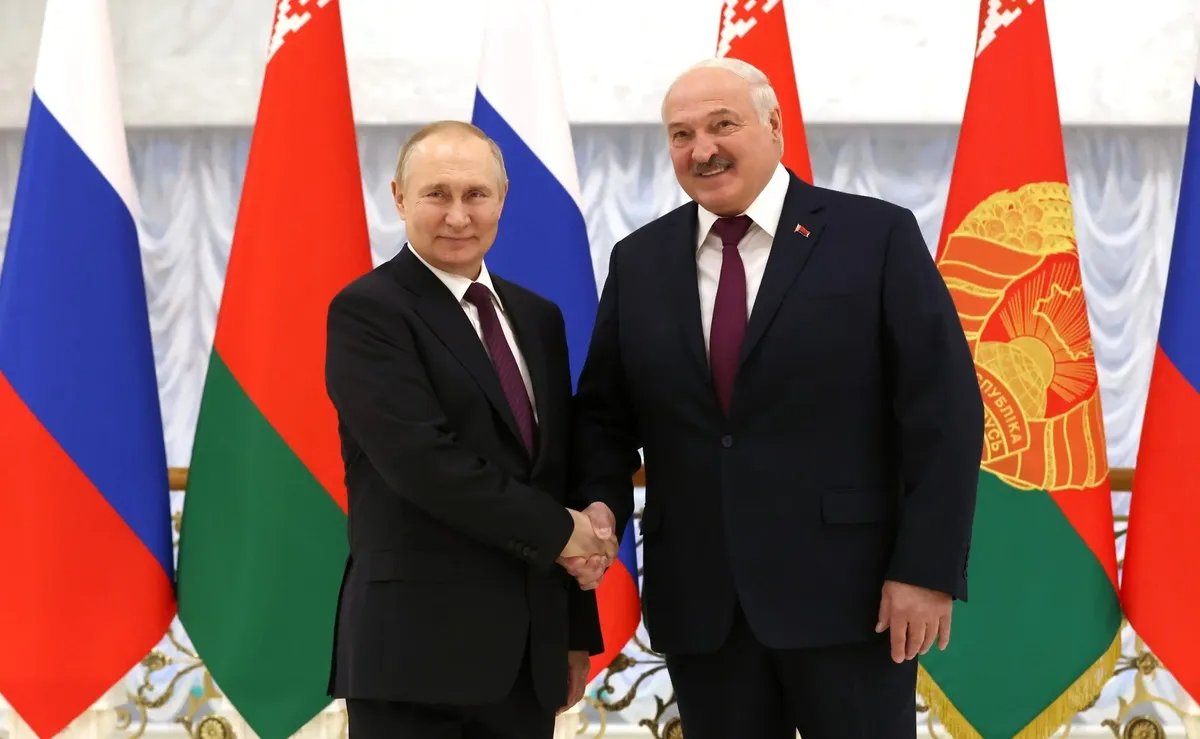
Vladimir Putin and Alyaksandar Lukashenka during a meeting in Minsk, 19 December 2022. Photo: Kremlin Press Office / Anadolu Agency / Getty Images
On ambivalence
“Blackmailing Belarus, forcing it to bow down, trampling on it is useless. I understand the hints: you’ll get oil, but get on with destroying your country and becoming part of Russia. I always ask the question: in the name of what are such things done? Have you thought of the consequences? How will people in our countries, how will the international community perceive this? Trying by all possible means to incorporate our country into another country!” — nowadays it seems hard to believe that Alyaksandar Lukashenka had so expressively accused Russia of attempting a takeover.
But he spoke these words only four years ago, at a press conference with Russian reporters in December 2018. Lukashenka had then invited a hundred Russian media outlets, both federal and regional, to visit Minsk.
This was obviously done to spite Vladimir Putin, who traditionally holds a large press conference in December — and now Lukashenka was meeting with the same reporters, but on his own turf.
At the time, Alyaksandar Lukashenka was less incensed by the increase in gas prices and more by Moscow’s demand for closer integration.
In December 2019, Dmitry Medvedev, Russia’s Prime Minister at the time, declared that further financial aid for Belarus would only be possible after all the integration road maps have been signed — 31 in total. Note that this statement was also made in December — it seems to be the most fruitful month for the development of bilateral relations. It is when the next year’s gas supply contracts get drawn up — and it was on 8 December 1999 that the treaty creating the Union State of Russia and Belarus was signed.
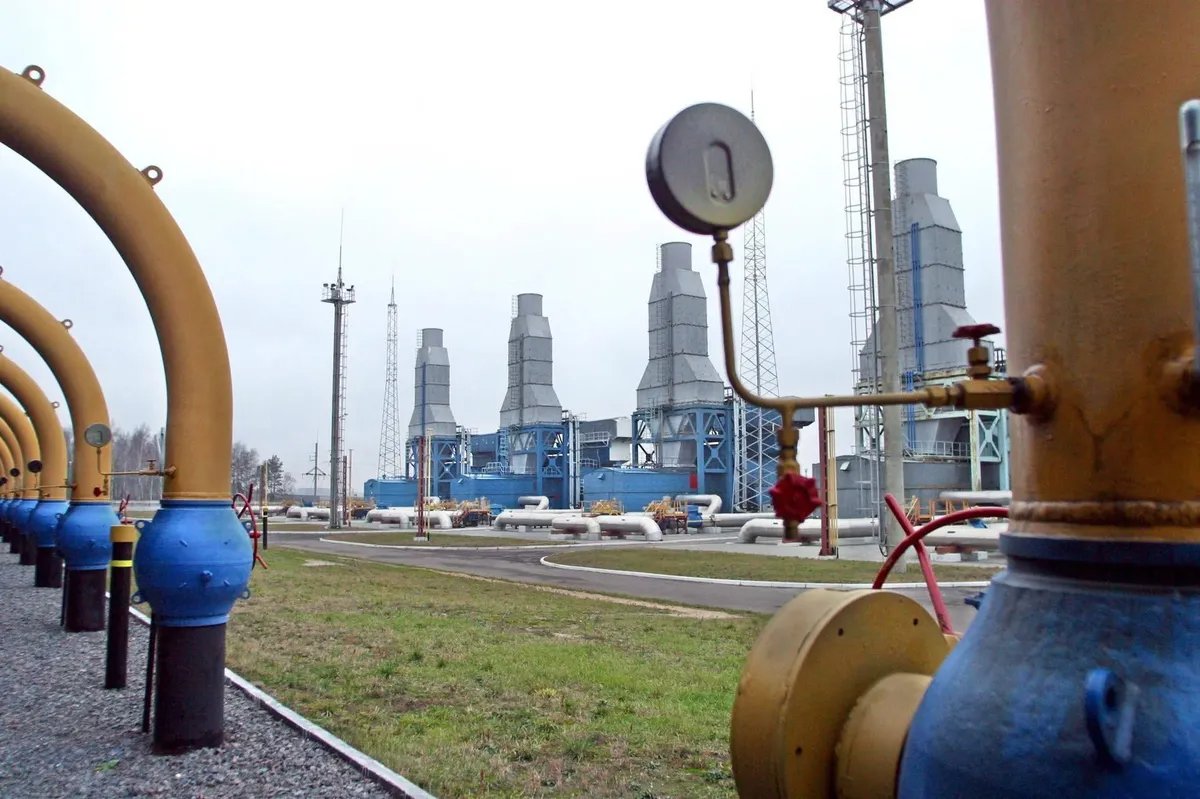
A compressor station of the Yamal–Europe gas pipeline in Nyasvizh, Minsk region, Belarus. Photo: EPA / MAXIM MALINOVSKY
“We have international contracts, and we haven’t violated a single one of them. Whereas Russia is going at them hammer and tongs”, Lukashenka said in 2017 after the FSB created a security zone on the border to Belarus. “I want for Russians, especially Russian leadership, to understand that we will not be their errand boys” — a line from his annual address in 2016. “They’re scaring us that Russia will design its own ‘centipedes’ (nuclear warhead transport trucks — translator’s note) and use them to transport its nuclear warheads. Go ahead! If today they have the brains and the money — which they don’t — let them design them!” he exclaimed a year earlier, in 2015.
Putin and I
After 2020, everything changed. First, the world became bogged down in the pandemic, and soon afterwards unprecedented protests erupted in Belarus.
In August and September 2020, it seemed that Lukashenka’s chair, which he had occupied since 1994, was on the verge of breaking, taking its dweller down with it. It was then that things started changing.
On 15 and 16 August, Putin and Lukashenka held two phone calls. Lukashenka’s press office reported the first call with a single laconic line of “the presidents discussed the situation in and around Belarus”. On the next day, which saw the largest protest march in the history of Belarus, the press release for the second call disclosed that the two presidents decided “that if the situation should escalate with respect to outside threats, the sides will act jointly in accordance with the articles of the Collective Security Treaty”. This was already a clear signal: we are always together, we always see eye to eye, so hold your horses and go home before we send in troops.
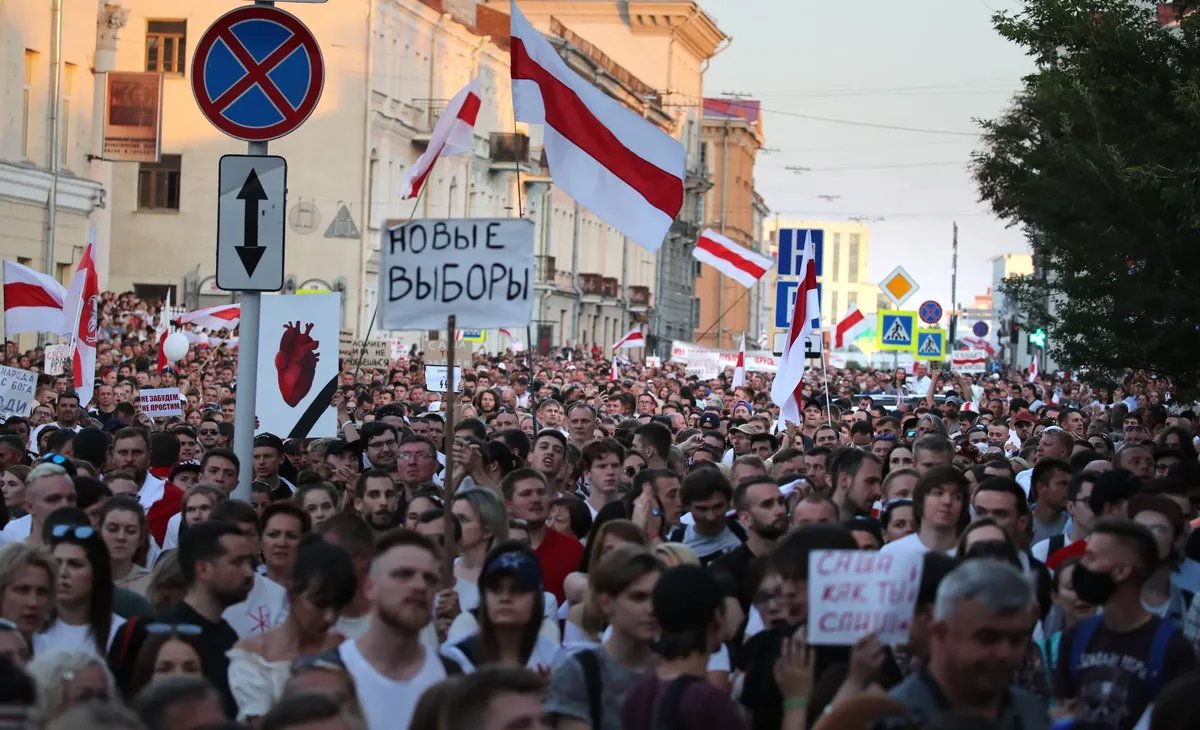
A protest rally against the results of the 2020 Belarus’ presidential election. Minsk, 17 August 2020. Photo: EPA-EFE / TATYANA ZENKOVICH
In an interview on 27 August, Vladimir Putin once again assured the world that he would help Lukashenka: “Alexander Grigoryevich (Lukashenka — translator’s note) has asked me to form a backup law enforcement unit, and I have done so. However, we also agreed that it will not be used unless the situation gets out of control: unless extremist elements hiding behind political slogans cross certain lines, starting to torch houses, banks, trying to seize administrative buildings and so on.”
Within a single day, Lukashenka had completely changed his tune. Before, depending on the state of gas price negotiations, he would often use phrases like “we will not bow”, “we will not give up our sovereignty”, “we’ll be fine without Russian oil because freedom cannot be measured in money” — and the pronoun “we” meant the Belarusian people. After the 9 August, Lukashenka’s “we” started meaning “Putin and I”.
17 August, during a visit to a wheeled tractor factory: “Oh no, Putin and I share the view that all of this fuss has a reason.”
21 August, visiting the Minsk region: “Of course, neither me nor Putin would ever let this happen, and we will respond harshly to such attempts.” (That day, Lukashenka also disclosed that Russian propagandists had arrived in Minsk: “I asked the Russians to give us two or three groups of reporters just in case. It was six or nine people from the best television channels…”)
22 August, during a trip to Hrodna: “Putin and I agree that we are being persecuted here in order to then attack Russia.”
28 August, during a trip to Orsha: “The Russian president and I understand what can happen if we miss the moment… We have both prepared reserves. Not a single soldier from Russia has crossed our border.”
8 September, at a press conference for Russian reporters: “I’ve spoken to many presidents, to my older friend, my older brother, as I call him — Vladimir Putin.” One suspects there might be a bit of vitriol in that remark, since Putin and Lukashenka have an age difference of two years. A four-year-old might consider a six-year-old to be an older friend, but by the age of 70 it already sounds like an attempt to taunt your “older friend and brother” by emphasising his age. Then again, this figure of speech might be simply residue from the days when it was still used in the context of “Belarus will not bow down”.
The pre-war paradise
Then, the frequent meetings began. They were long, intimate, with tender intonations, like a get-together with an old — sorry, older — friend. On 14 September, the day after 100,000 people attempted a march on Lukashenka’s residence in the Drazdy settlement and hundreds were arrested, he himself flew to Sochi (where Putin’s summer residence is located — translator’s note).
He later claimed they had discussed market convergence and military and industrial cooperation. The meeting with Putin inspired him to the following phrase: “An army that does not fight is not an army!”
Perhaps it was back then that we should have grown suspicious. Never before had he spoken of armies that should be at war. Today, looking at tangential signs, oblique phrases, and slips of the tongue it seems that already then, 18 months before it started, the two had been discussing both the war and the ensuing sanctions, as well as ways of circumventing them.
During that meeting, the massive loan repayment that Belarus was supposed to effect in 2020 was put off till next year. In return for Moscow’s support and protection,
Lukashenka promised “never to throw a stone against the East, against Russia”. The great Russo-Belarusian paradise had started.
Alyaksandar Lukashenka and Vladimir Putin met six times last year. On 22 February 2021, Lukashenka flew to Sochi — again. The integration road maps that had caused so much contention in 2018 and 2019 suddenly became referred to as alliance programmes (Lukashenka even used the buzzword “rebranding”), and the “younger friend” reported to the older one that there were no more disagreements and everything was ready for signing.
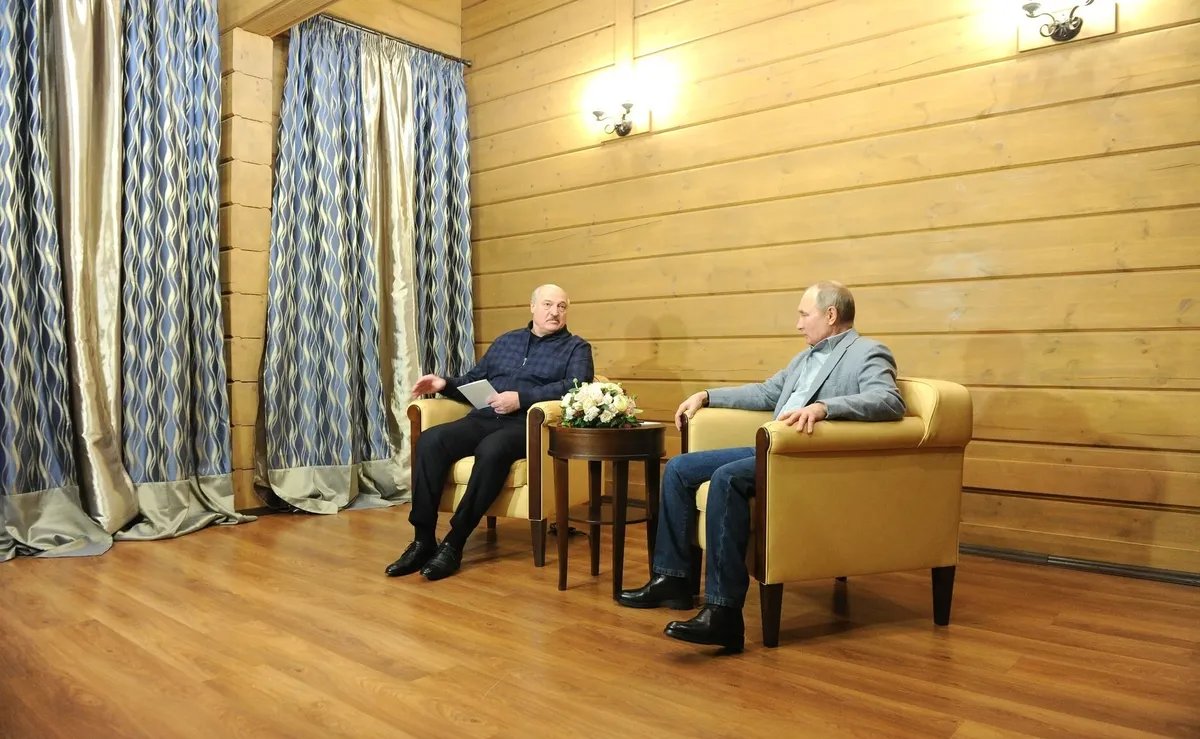
Alyaksandar Lukashenka and Vladimir Putin during a meeting in Sochi, 22 February 2021. Photo: Kremlin Press Office / Handout/Anadolu Agency / Getty Images
On 22 April, Lukashenka visited Moscow and, apart from once again reporting on how the alliance programmes were ready for signing, the pair gossiped about Ukraine and Volodymyr Zelensky. “The current Ukrainian leadership has recently taken very many steps that are destroying Russian-Ukrainian relations,” Vladimir Putin said. “It seems to me, Vladimir Vladimirovich, that it’s time Zelensky learned to behave concretely and diplomatically, among other things,” Lukashenka toned in subserviently.
28 May — Sochi again, a meeting that was completely useless as far as informing the public went. Lukashenka and Putin reminisced about how a year earlier they brought their citizens back from countries that had gone on lockdown and cancelled flights, discussed the temperature of water in the Black Sea and whether they should go for a swim. The next day, the pair went for a short yacht trip. Only a month had passed since their previous meeting. There seemed to be nothing worth discussing.
On 13 July, Lukashenka visited Saint Petersburg, and then Moscow on 9 September. Everything was as idyllic as ever. They even held a joint press conference where they told everybody once more about strengthening their countries’ union and how the alliance programmes were ready for signing.
It turned out, despite Lukashenka’s fear-mongering remarks in 2018, there was never any danger of Russia taking over Belarus. Three years later, during a meeting with Putin on 9 September 2021, Lukashenka conceded: “I must say that the Russian president and I never had this disease. If anyone did, we can patch you up.”
Only they obviously did not patch themselves up — during the next meeting of last year (29 December) they talked quite transparently about the future war and the extent of Belarus’ involvement in it. Several times, Lukashenka repeated his call to hold more Russian military drills on Belarusian territory, or better still not to stop them.
Vladimir Putin responded: “As you have suggested, we will hold [the drills] early next year. The military will decide. March, February — I don’t know when they will decide.”
Now we know when they decided. And we know what they decided about the “joint drill”.
At the time, it didn’t sound haunting — just the typical demagoguery. Today, it sounds like a warning that the world failed to hear.
Accomplices
In a way, the war also started with one of their meetings. On 10 February, the two countries’ military forces launched a massive drill in Belarus, including electronic missile launches by a joint group of missile forces, air combat, strikes against equipment convoys by Smerch and Uragan multiple-launch rocket systems, and missile and bomb launches from planes and helicopters.
Lukashenka observed all of this very attentively at the Asipovichsky training facility before leaving for Moscow. It was then that he said that Russian forces would remain in Belarusian territory after the drill for as long as was needed (“as long as we need to defend our territory and show everyone that we are ready for this defence”). Asked about the possibility of remaining Russian forces invading Ukraine from Belarus, Lukashenka responded: “Do you still believe that we will attack Ukraine from here? Are you still entertaining this crazy idea?” The attack was only a week away.
On 18 February, Lukashenka arrived in Moscow, and both presidents made public assurances that nobody was planning to attack Ukraine, that it was the West creating tensions (and disseminating rumours that the attack was about to happen), that neither Russia or Belarus were interested in such a step. As for the meeting — they allegedly needed it to discuss measures to withstand the economic pressure. They were hardly thinking about McDonald’s and IKEA leaving their markets at the time, but they were preparing for sanctions — and for the war — in earnest.
11 March in the Kremlin, they discussed countermeasures against sanctions. 12 April on Vostochny spaceport, they confessed to each other that they had one common Fatherland — and Lukashenka also used the moment to say that the English were responsible for the Bucha massacre but that Russian and Belarusian security services managed to expose this “nasty, disgusting position of the West”. On 16 May in Moscow, the duo discussed import substitution. On 23 May in Sochi, they marvelled at how quickly the economy of the Union State is growing despite sanctions and expressed concerns about Poland wanting to partition Ukraine and take a piece for itself.
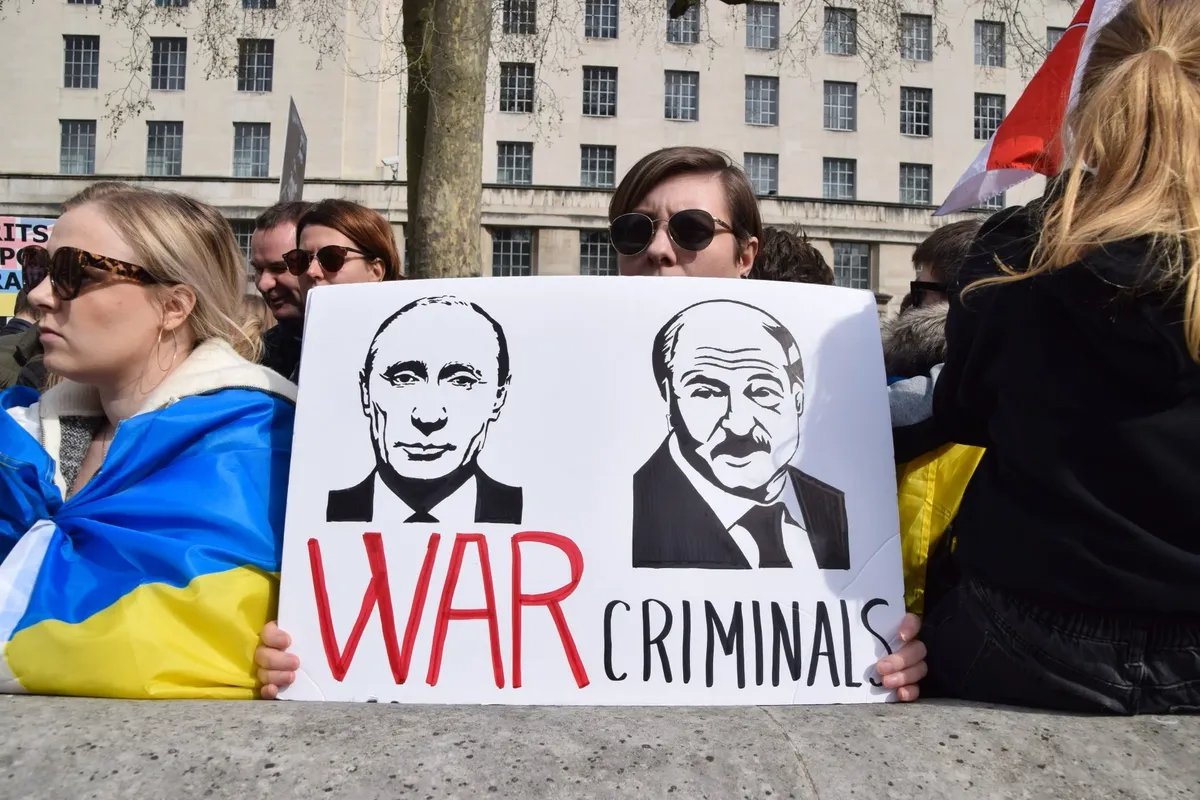
An anti-war rally in London, 10 April 2022. Photo: Vuk Valcic / SOPA Images / LightRocket / Getty Images
On 25 June in Saint Petersburg, Lukashenka asked for Putin’s help in modifying military aircraft to carry nuclear warheads, while Putin promised the modernisation of Russian aircraft repair bases and training for Belarusian servicemen. He also threw Iskander ballistic missile systems in the package.
On 26 September in Sochi, they declared that they demanded respect and would not speak to anyone without it, since they are proud Slavs who will not tolerate humiliation. On 7 October in Moscow, Lukashenka presented Putin with a tractor.
On 19 December, Vladimir Putin visited Minsk for the first time in three years — it was their eighth tête-à-tête meeting of the year. After extensively discussing a Belarusian astronaut going to space with a Russian crew and the training of Belarusian pilots to fly Russian modernised aircraft, the two allies went to Lukashenka’s residence in Astrashytski Haradok for a “real Belarusian dinner”. Putin’s plane took off from Minsk Airport at one o’clock in the morning. The dinner must have been a success.
In addition, there have been meetings during summits of the Union State, the CIS, the Eurasian Economic Union, as well as countless phone calls. In any conversation, be it with ambassadors, reporters, or civil servants, Alyaksandar Lukashenka uses his already-set phrase “Putin and I”. The less he says “I”, the more he says “Putin and I”. Did their mothers never tell either of them not to hang out with bad company?
Even close friends do not meet this often when they live in different countries. Allies do not meet this often. Only accomplices meet this often. And one of them has voluntarily taken on the role of the younger minion: voiceless, dependent, running menial errands — standing watch or nipping outside for some beer.
Join us in rebuilding Novaya Gazeta Europe
The Russian government has banned independent media. We were forced to leave our country in order to keep doing our job, telling our readers about what is going on Russia, Ukraine and Europe.
We will continue fighting against warfare and dictatorship. We believe that freedom of speech is the most efficient antidote against tyranny. Support us financially to help us fight for peace and freedom.
By clicking the Support button, you agree to the processing of your personal data.
To cancel a regular donation, please write to [email protected]
